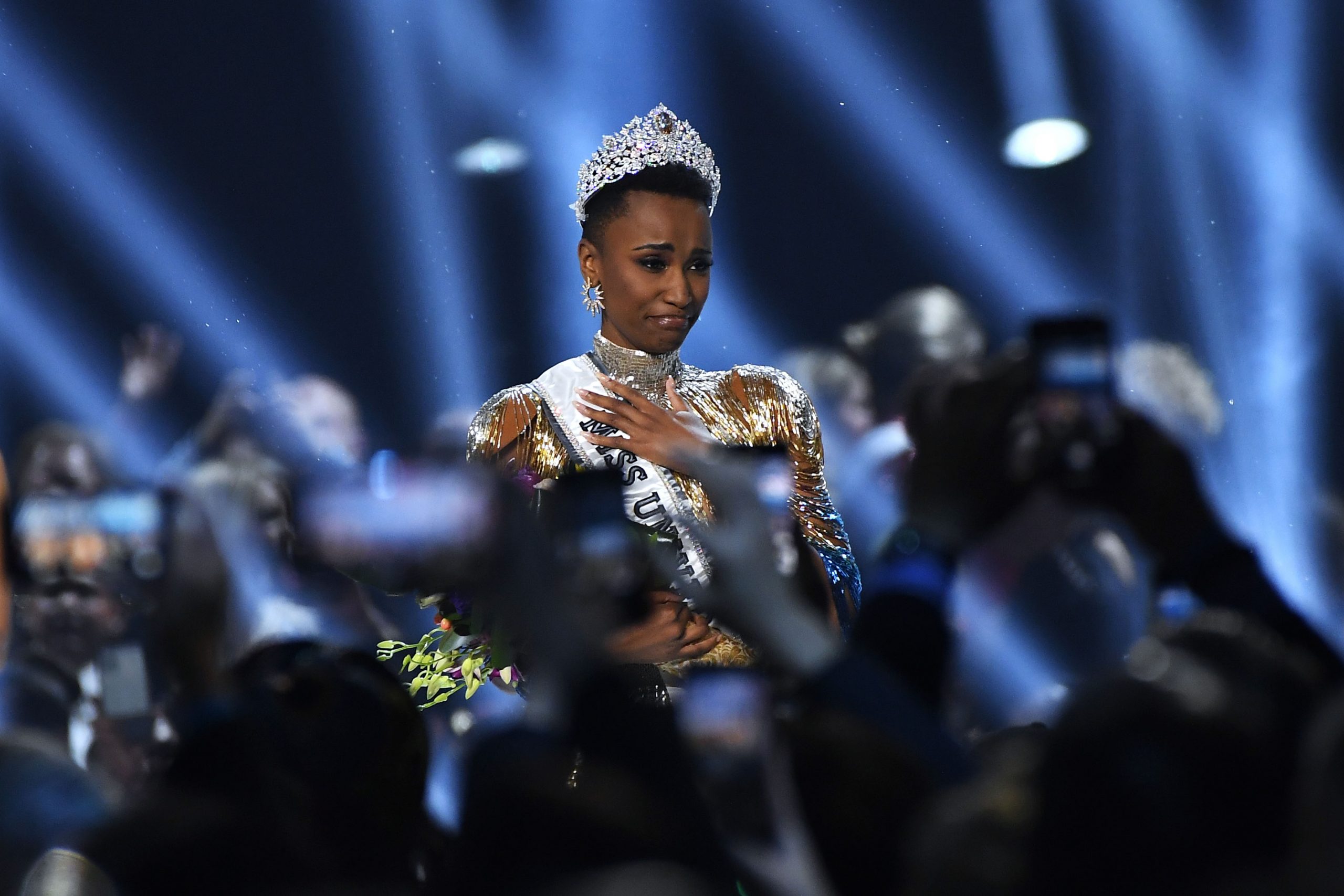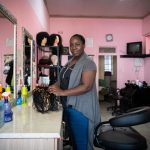The politics and presence of Zozibini Tunzi
By choosing deliberately to take up space, the new Miss Universe has used pageantry’s enormous audience to stage feminist interventions and do the work of politics.
Author:
20 December 2019

Zozibini Tunzi is iridescent. Her 4c fade perfectly frames her symmetrical face. She is undeniably beautiful. Draped in a Biji Gibbs gown, inspired by the African soil and the Eastern Cape’s coastline at sunrise, Tunzi stills herself.
Steve Harvey’s booming voice declares, “Now we are down to South Africa and Puerto Rico.” These are the final moments of the Miss Universe pageant at the Tyler Perry Studios in Atlanta.
The South African beauty queen clasps Ms Puerto Rica’s hands firmly. Both women breathe out heavily. Anxious. Excited.
Steve Harvey’s voice reverberates across the room. “Only one of you can be crowned Miss Universe. If for any reason the winner is unable to fulfil her duties, the runner up will take her place.”
Both women are clearly nervous. Their stillness gives way to fidgeting.
“Good luck to you both,” chimes Harvey.
Finally, he is ready with the result.
“The new Miss Universe is…”
Pause.
“South Africa.”
Pageantry and the work of femmes
Cut to a week later. Zozibini Tunzi is Miss Universe. She is a guest on The Daily Show with Trevor Noah. She glistens in a silver cocktail dress that hangs on her effortlessly. In words she has used before, her crown “sits beautifully on her kinky coarse hair”. Tunzi is in her element. She is confident, clear and charming.
“Congratulations!” starts Trevor, “Miss Universe, has it sunk in yet?”
“I don’t think so,” responds Tunzi. “I think this … is now, almost a week now. I think I am getting used to it because at first people would be like, ‘Miss Universe’ and I would just continue going because that’s not me.”
Tunzi is practised, personable and funny. She is clearly working the room.
Noah clocks this, and responds with his own brand of humorous charm.
“Miss Universe,” he responds, affecting an American accent, “Jupiter, please! Miss Universe.”
The two South Africans are enthralling an American audience on a coveted time slot on night time television.
Tunzi nods as Noah frames his question. He is prepared and taking the discussion seriously. It is clear from his demeanour that he recognises the politics of beauty. Perhaps more profoundly, he recognises what Tunzi intends to do with it, how she is using a platform often subject to misogynistic vitriol as a site of entry for clear, critical discussion. Tunzi has actively subverted the tired, lazy stereotype of the ditzy beauty queen, which denies the fact of her intelligence. She has come to do feminist work.
Noah recognises this and begins the work of allyship. He is committed to the act of listening, critically engaging his feminist interlocutor with respect and understanding. Tunzi is about to cement herself into this discussion and to take up space. Noah will not get into her way.
Pretty hurts
On her eponymous fifth studio album, Beyoncé belts Sia Furler’s delicately crafted lyrics:
Pretty hurts
We shine the light on whatever’s worst
Perfection is a disease of a nation
Pretty hurts, pretty hurts
Pretty hurts
In the extended director’s cut of the music video, Beyoncé plays a troubled beauty queen. A sash with the words Miss 3rd Ward is draped across her body. The video cuts to shots of her reckoning with an eating disorder, seeking consultation for plastic surgery and working on a clearly gruelling exercise regime. Beyoncé’s mellifluous vibrato frames the disturbing visuals.
Just another stage
Pageant the pain away
This time I’m gonna take the crown
Without falling down, down, down
In her essay, Being Pretty is a Privilege, But We Refuse to Acknowledge It, transgender activist Janet Mock reflects on the ways in which beauty and the perception of beauty create and sustain various societal privileges for its benefactors. Put differently, Mock meditates on the ways in which femme-presenting women occupy the world as a result of their beauty.
Mock writes: “Pretty privilege can give way to more popularity, higher grades, more positive work reviews and career advancement. People who are considered pretty are more likely to be hired, have higher salaries and are less likely to be found guilty and are sentenced less harshly. Pretty people are perceived as smarter, healthier and more competent, and people treat pretty people better. Pretty privilege is also conditional and is not often extended to women who are trans, black and brown, disabled, older and/or fat.”
That said, Mock warns of the complexities of desire. Being beautiful or desirable does not shield you from patriarchal violence. In fact, through the nebulous intersecting oppressions inherent in patriarchal society, beauty can also work against you. Often beautiful women are objectified in harmful and destructive ways. Beautiful women are sometimes stripped of their agency or have their intellectual contributions diminished and unacknowledged in both the home and the workplace. For some women, when patriarchy renders itself in its ugliest form, beauty can be deadly.
Related article:
This is a familiar story across the world. The murder of Karabo Mokoena and so many others haunt South Africa’s conscience. Mock reiterates this idea and details how trans women are also systematically under threat.
Mock writes: “It is also important to acknowledge that there are repercussions, too, specifically in spaces of desire. Cis men have often claimed that they were ‘deceived’ or ‘tricked’ by a trans woman who was assumed to be cis and was thereby deserving of the violence she faced. This harmful yet all-too-pervasive belief has gone so far as to be used as defensive arguments in courts across the country, called the ‘trans panic defense’.”
In a patriarchal society that values women on the basis of their looks and bodies, Mock shows that women can never truly win. The system of patriarchy is totalising and while it may offer a temporary reprieve to those that are considered desirable, it is both dangerous and debilitating.
Pageant the pain away
Tunzi knows this all too well. Onstage at the Miss South Africa pageant, during the first Q&A session, Tunzi said, “We have absolutely no reason to keep smiling, because South African women are dying every day and mostly people are doing nothing about it. It is not up to us, it’s up to perpetrators to start doing right.” It was a moment of serious politics insistently brought into the pageant setting. It was feminist work.
This kind of answer was, until recently, unimaginable because of the way pageants have sanitised socio-political issues and avoided a determined politics. Tunzi was willing to give up the crown to speak the truth – both at Miss South Africa and Miss Universe.
She echoes these sentiments in her discussion with Noah as she explains why she used the Miss Universe platform to highlight gender-based violence and femicide.
Related article:
In an earlier interview with radio host Sway Calloway, Tunzi gave a similar answer. “I needed a platform to be able to speak my mind and speak about the things that I am passionate about and things that I feel are important in the world and people need to hear about.”
As the first black South African woman to wear the crown, Tunzi is not naive to the value of a pageant like Miss Universe and how it is signalled to the rest of the world. Miss Universe is an annual international beauty pageant that is run by the United States-based Miss Universe Organization. The contest is the largest pageant in the world in terms of live TV coverage, airing yearly in more than 190 countries worldwide to an audience of over 500 million people. These spaces must be consistently critiqued for the intersection of damaging, normative exclusive beauty ideals, patriarchy and capitalism. But we should also take seriously the work of participants like Tunzi, who are deeply invested in making space for thoughtful, meaningful work within them.
Speaking up about gender-based violence to over 500 million people is no small feat. Tunzi has an audience most politicians can only dream of. She uses Furler’s lyrics as an invitation, an attempt to quite literally “pageant the pain away”.
This is not a new preoccupation for Tunzi. In an interview during her reign as Miss South Africa, she responded incisively about the tiresome, hyper-consumerist spectacle that is women’s month.
“Someone asked me … if I thought we had a successful women’s month this year. And I thought to myself, how? When we’re dying for being women. As far as I’m concerned, women in my country are an endangered species. Stop killing us!”
Brown skin girl
Earlier on in the pageant, before he announced her as the winner, Steve Harvey asked Tunzi, “What’s been your go-to song this week?” Tunzi responded: “You know, Steve, to pair up my singing, I like to self-affirm every morning. I look at myself in the mirror and I say, ‘You’re beautiful, you’re capable and you’re intelligent.’ So, this week I was listening to Brown Skin Girl just to activate that black girl magic.”
The 15th track on Beyonce’s The Lion King: The Gift album begins:
Brown skin girl
Your skin just like pearls
The best thing in the world
Never trade you for anybody else
By invoking this song at that moment, Tunzi was able to further signify more of her feminist work around the politics of beauty and representation to a global audience.
Tunzi explicated this point in her discussion with Calloway. “I think that we need to understand how important inclusion and representation is and that is something that has been ignored for a very long time. You know, even among the black community we have things like colourism – the further away your skin is from being light, the uglier you are or the further you are from beauty … it’s things that we might think are very small but as a young girl, it does something to you and your confidence and what you want to offer to the world.
Related article:
“I grew up in a society where women like me were never believed to be beautiful because of my kind of skin and my kind of hair. It didn’t matter what I had to offer to the world because you just looked at me and dismissed me.”
As the new queen of the universe, Tunzi is deliberately working within and through the historically complicated institution of pageantry, using the mechanisms at her disposal to think differently about the potential of this space and work with its challenges.
This is what feminists have always done – created space for themselves in a world where space is consistently closed off to them (even when, like on a pageant stage, it appears to be about women but is suffused with a long history of patriarchy). Feminists write, picket, protest, speak and riot. And, as Tunzi has shown, they also walk across pageant stages, open their mouths and commit to taking up space and cementing their politics.



